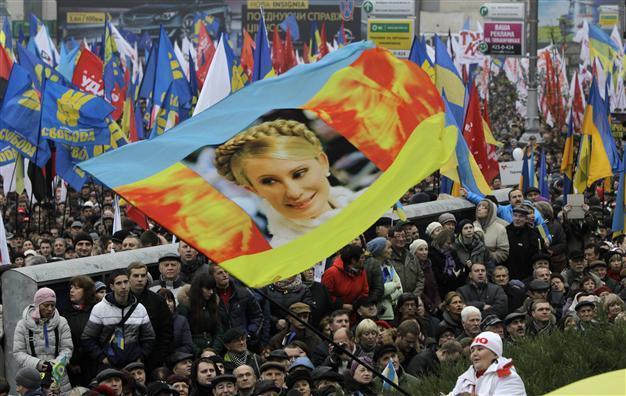Tymoshenko goes on hunger strike in support of pro-EU protests
KIEV - Agence France-Presse

Demonstrators hold up a flag with the face of jailed former Ukrainian prime minister Yulia Tymoshenko during a protest in Kiev, Ukraine, Sunday, Nov. 24, 2013. AP Photo
Jailed Ukrainian opposition leader Yulia Tymoshenko went on a hunger strike Tuesday in solidarity with thousands of pro-European protesters outraged with the ex-Soviet state's shock decision to scrap a key EU pact.
The fiery co-leader of the 2004 pro-Western Orange Revolution made her announcement in a letter read out Monday night to 20,000 EU integration supporters who thronged central Kiev for the second day running.
"I am announcing an indefinite hunger strike demanding that (President Viktor) Yanukovych sign an association and free trade agreement with the EU," the former Ukrainian prime minister said.
"And if Yanukovych does not sign our agreement with the EU on November 29, wipe him off the face of Ukraine through peaceful and constitutional means" along with his "political and corrupt" cronies, Tymoshenko added. "Don't stop!" The nation of 45 million has been thrown into fresh political crisis by the government's abrupt decision to scrap the signature of a historic deal with the European Union at a summit in Vilnius later this week.
The about turn came shortly after Yanukovych held clandestine talks in Russia with President Vladimir Putin meant to address the tough economic sanctions Moscow planned to slap on Kiev if it signed the pact.
The so-called Associate Agreement would have put Ukraine firmly on the path to eventual EU membership and pulled it out of Russia's historical orbit.
But Putin sees Ukraine as a vital member of a rival economic bloc called the Eurasian Customs Union that already includes Kazakhstan and Belarus.
Yanukovych late on Monday justified his decision, saying it was based on the dangers that economically struggling Ukraine would face if it ruptured its tight trade ties with Russia.
"I want peace and calm in our big Ukrainian family," the Ukrainian president said in a video statement posted on his website.
Yanukovych argued that he could not act "to the detriment of Ukraine and its people" and assured his critics that "no one will rob us of a dream about a Ukraine of equal opportunities, about a European Ukraine." Ukraine's decision to abandon the Association Agreement came after parliament repeatedly failed to adopt legislation that would have freed Tymoshenko -- a top EU condition for the signing of the deal.
Some analysts believe that Yanukovych feels threatened by Tymoshenko and would like to keep her out of politics until he runs for re-election in polls scheduled for March 2015.
Tymoshenko was sentenced to seven years in jail in 2011 -- a year after she lost to Yanukovych in a bitter 2010 poll -- on abuse of power charges that she and the West say were politically motivated.
Yanukovych is still scheduled to travel to Vilnius for the Eastern Partnership summit and some EU leaders appeared to hold out hope that Kiev may still change its mind.
The 28-nation European bloc said that its offer was "still on the table" and reiterated its criticism of Russian pressure on Ukraine.
"The deadline for that is Friday morning," EU Enlargement Commissioner Stefan Fuele told Ukrainian reporters by video link from Brussels.
Ukraine remains a culturally divided country that is evenly split between a Russian-speaking east with a natural affinity toward Moscow and the nationalist Ukrainian-speaking west.
Yanukovych's decision to freeze the EU negotiations has once again polarised Ukraine along its historic fault lines.
The Kiev protests -- drawing a crowd of more than 100,000 on Sunday -- have been the largest since the Orange Revolution overturned a rigged presidential poll and forced a new ballot that saw a pro-Western president, Viktor Yushchenko, elected in the ex-Soviet state. After a troubled first term, he failed to get enough votes to make it to a second round in the 2010 presidential poll.
The new protests threaten to disrupt the economically-struggling country for days and possible weeks to come.
The largely peaceful protests have been marred by sporadic clashes between demonstrators and riot police forces that have resulted in tear gas being fired at both sides.
Protesters have also set up a few dozen tents in central Kiev where they spend the night to make sure that police do not close off the squares where the largest demonstrations are being held.
